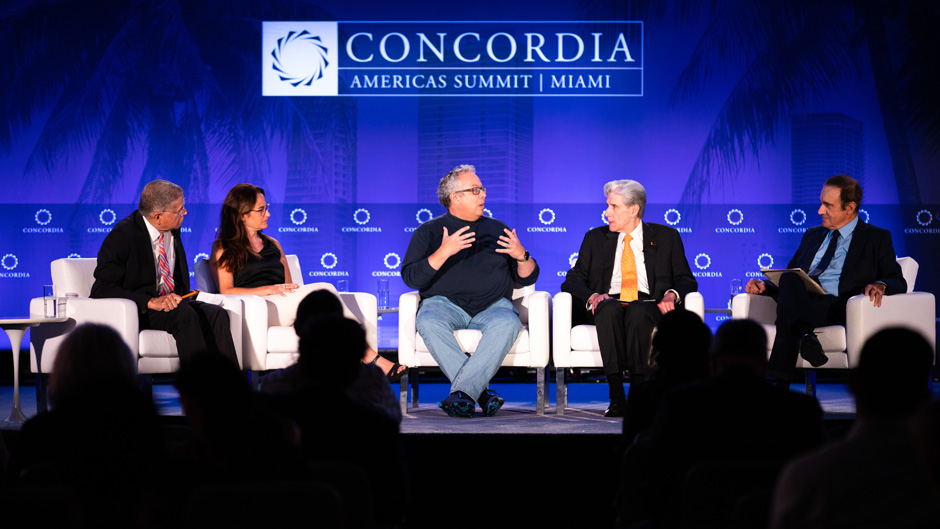University of Miami President Julio Frenk and Felicia Knaul, director of the Institute for Advanced Study of the Americas and Hemispheric and Global Affairs, showcased University initiatives and involvement in two key panels that formed part of the two-day forum that convened cross-sector decision-makers, changemakers, and influencers from around the Americas.
The in-person forum, aimed to generate solutions to critical issues facing the Western Hemisphere, took place at the University of Miami Shalala Student Center on the Coral Gables Campus.
“The problem is not technology itself—we need to be clear about that—it is the use that we make of it,” said Frenk. “It is also true that the technologies we’re talking about, particularly artificial intelligence (AI), are qualitatively different in the interconnected world we live in because of the pervasiveness with which they can falsify reality. And that is the big challenge.”
Miami Herald journalist Andres Oppenheimer moderated the midday session, sponsored by the John S. and James L. Knight Foundation, that explored ways in which technology is impacting democracy in Latin America. He was joined by Frenk, Alberto Ibarguen, president and CEO of the Knight Foundation; Tamara Taraciuk Broner, acting director, Americas Division of the Human Rights Watch; and Rony Abovitz, University alum and founder and CEO of Sun and Thunder, a startup that aims to do AI storytelling.
Frenk noted that the panel discussion was the third conversation in an ongoing series sponsored by the Knight Foundation that has included Abovitz and other changemakers. The initiative seeks to amplify the conversation on how new technologies can be used to strengthen democratic tendencies in the face of the rise of autocratic regimes and has generated a white paper.
In terms of action steps, Abovitz has called for a convention that brings together the top technological thinkers from around the globe—a gathering that replicates the Constitutional Congress of 1787, which convened the best and brightest minds of the time to draft the U.S. Constitution.
“The framers were the most enlightened and modern thinkers of the day, and we need to do that again to do a reboot and restate democratic values and practices,” suggested Abovitz.
In response to a question, Frenk detailed a number of fundamental roles that universities should play to promote democratic practices that include conducting research, convening neutral spaces for dialogue, serving as seed beds for critical thinkers and “counterbalance” for autocratic thought, fulfilling their historic role as exemplary institutions by adopting and adhering to democratic values, and producing the next generation of democratic thinkers.
Taraciuk Broner discussed several ways that Americas Watch is using visual technologies such as satellite imaging to provide irrefutable evidence complemented by traditional reporting to document and sanction human rights abuses. The surveillance has been used to report on prison massacres in Ecuador, illegal and environmentally damaging gold mining in Venezuela, and abuses of protesters at rallies, among others.
In a morning session, U.S. Surgeon General Dr. Vivek Murthy and Shawn Singh, CEO of Vistagen Therapeutics, explored avenues to address the mental health crisis in the region—especially in terms of adolescents—that has been exacerbated by the pandemic.
“A Crisis Unfolding: Migration and Refugees in Latin America” was held in the afternoon and Knaul facilitated a conversation with Miguel Pizarro, commissioner to the United Nations, Interim Government of Venezuela; Alfonso Quiñonez, Guatemalan ambassador to the U.S.; and Andrew Selee, president of the Migrations Policy Institute.
Knaul posed questions regarding the plight of the nearly 14 million Venezuelans—one-fifth the total population—who have fled the country because of extreme conditions, the potential for a common framework to address migration in the region, how changes in U.S. immigration policy could improve the scenario, and the importance of employing a gender lens in addressing immigration policies.
Quiñonez pointed to the importance of temporary working visas for Guatemalans “pushed” from their country by lack of opportunity and “pulled” to the U.S. by the huge number of job vacancies.
Without the legal visas, migrants seek out “coyotes,” who charge between $10,000 to $15,000 and the crossings are often rife with abuse, according to Selee. With about 240,000 encounters documented, the illegal industry generates billions of dollars, he pointed out.
“We have to disrupt this industry,” Selee said. “The U.S. could do something about increasing the number (of temporary visas), not just for agricultural workers but for other workers as well, and to make the process less complicated. It’s a win-win for all.”
Knaul applauded the panelists for their insightful solutions pointing the way on “how to convert a human made crisis into a set of human-made solutions looking at innovations like opportunities for care and economics of hope.”

